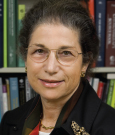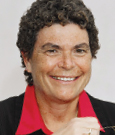In March 2015, Sage Bionetworks and Apple released “Share the Journey: Mind, Body, and Wellness After Breast Cancer,” a patient-centered iPhone app that tracks five common consequences of breast cancer treatment, including fatigue, cognitive function, sleep disturbances, mood changes, and a reduction in exercise performance. Users can also customize the app to include information about sexual dysfunction and other health concerns.
The Share the Journey app is an interactive research study that aims to understand why some breast cancer survivors recover more quickly than others, why their symptoms vary, and how their symptoms can be improved. The study is open to both healthy women and breast cancer survivors between the ages of 18 and 80 who live in the United States.
Enrolling healthy women into the study is crucial to understanding the “human cost of breast cancer treatment,” said Patricia Ganz, MD, Director of Cancer Prevention and Control Research at UCLA’s Jonsson Comprehensive Cancer Center in Los Angeles and a collaborator on the development of the Share the Journey app.
“So often when I measure outcomes in women with breast cancer, the issue is how much is due to aging and how much is due to the cancer,” said Dr. Ganz. “The opportunity to have a large group of healthy women also complete the same instruments in a contemporaneous way may shed more light on how people either cope and improve their situation or who might be having more difficulty.”
The Share the Journey app uses an Apple open-source platform called ResearchKit. Developed by the Jonsson Comprehensive Cancer Center, Penn Medicine, Dana-Farber Cancer Institute, and Sage Bionetworks, who is the sponsor of the study, the app can be downloaded for free at the iTunes App Store (sharethejourneyapp.org). To ensure participants’ confidentiality, each user is assigned a unique, random code for data collection by the researchers.
In addition to Dr. Ganz, Ann H. Partridge, MD, MPH, Clinical Director of the Breast Oncology Program at Dana-Farber Cancer Institute; Judy E. Garber, MD, MPH, Director, Cancer Risk and Prevention Clinic at Dana-Farber Cancer Institute; Kathryn H. Schmitz, PhD, MPH, Professor of Epidemiology in Biostatistics and Epidemiology at the University of Pennsylvania Perelman School of Medicine; and Susan Love, MD, Medical Director of the Dr. Susan Love Research Foundation were also advisers on the development of the app.
Empowering Survivors
Share the Journey is meant to provide women and their doctors, as well as the researchers monitoring the information, with a comprehensive, accurate accounting of participants’ daily health experiences. “This technology allows women to track the symptoms of their disease and what they think is making them feel better or worse,” said Andrew Trister, MD, PhD, MSE, Senior Physician at Sage Bionetworks and an investigator of the research study. “The study is geared toward the idea that we will be able to turn what has previously been thought of as objective responses from people—also called anecdotes—about their disease into actionable, objective signals. Ultimately, we can use those signals to fuel further research that may lead to interventions to help people better live their lives after treatment. This study allows patients to see whether their health is getting better because they take on the role of being more of a manager of their symptoms and less of a voyeur.”
The app periodically asks women to answer questions about their current health and medical history; level of fatigue and mood; cognitive changes; and sleep and exercise patterns; it sends notices asking participants to complete certain tasks and surveys. The app then tracks and stores participants’ responses to the surveys; their journal entries about their symptoms; and data they input about various tasks they performed, such as the amount of physical activity they completed in a day.
“This gives survivors the ability to know how they are doing in real time,” said Dr. Ganz. “We know from behavioral science research that very often people underestimate or overestimate how much they are walking or how much they are eating in a day. We built into this app the ability for users to monitor the number of steps they take and how many flights of stairs they climb daily. It also allows users to set goals for exercise.”
Having the ability to capture a variety of information from patients, said Dr. Ganz, can provide clinicians with a strategy to personalize treatment. “About 25% to 30% of women have ongoing problems after breast cancer treatment ends, and that is the group we need to find better interventions for. We need to know who these women are and what their issues are. If we could identify these women early on and/or during this post-treatment data collection and learn the integrated characteristics that will cause them to have ongoing fatigue or cognitive difficulties, we might be able to personalize strategies to treat these patients upfront or follow up with early intervention,” Dr. Ganz explained.
Furthering Breast Cancer Research
The Share the Journey study will last about 6 months. Data captured in the app will then be processed and analyzed by the study investigators and reported in scientific publications. Share the Journey participants can also opt to share their coded study data with researchers outside of this study.
“We think having data from this study shared broadly with the research community will help answer questions [about the after effects of breast cancer] from previous studies and help us gain insights from other research projects,” said Dr. Trister. “I also think this type of technology could lead to greater participation in traditional clinical trials.”
Using Technology to Improve Care for Survivors
The Share the Journey app is not the first digital tool Dr. Ganz has helped develop. Several years ago, in response to the recommendations in the Institute of Medicine’s 2005 report, From Cancer Patient to Cancer Survivor: Lost in Transition, which concluded that every cancer survivor should have a coordinated survivorship care plan after treatment, Dr. Ganz collaborated with others to launch Journey Forward. Her collaborators included the National Coalition for Cancer Survivorship, Anthem, Inc., Genentech, and later the Oncology Nursing Society. The app was initially designed as a web-based care plan builder for professionals and has now expanded to include resource tools for patients and survivors in the form of a downloadable medical app.
The Journey Forward app allows survivors and oncologists to create a post-treatment plan and includes a summary of the survivors’ cancer diagnosis and treatment; a schedule for follow-up tests and surveillance; an area for psychosocial assessment; and information on managing ongoing symptoms and what to expect following treatment.
The app can be downloaded for free to both Apple iOS and Google Android mobile devices. The My Care Plan section of the app can also be downloaded in a printable PDF format. A Survivorship Library for Patients, where survivors can find information about their symptoms and care, is available on the Journey Forward website. To access the Survivorship Library for Patients and download the Journey Forward app, visit journeyforward.org.
“The information in the treatment and summary care plan in Journey Forward can help survivors start a conversation with their health-care team,” said Dr. Ganz. “It really is a way to increase patient empowerment.” ■
Disclosure: Dr Ganz is on the advisory board for InformedDNA. Dr. Trister reported no potential conflicts of interest.





